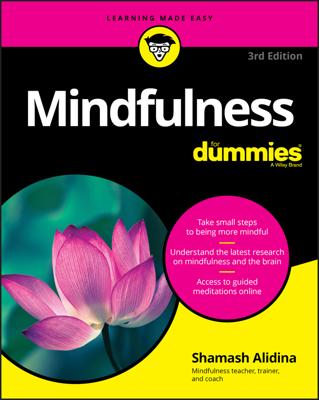Ultimately, mindfulness is about realizing that you’re more than just your body, mind and heart. You’re more than your fleeting thoughts and fluxing emotions. You’re more than your illness. Through the practice of mindfulness, and a natural self-enquiry that arises from meditation, you begin to discover a different dimension of yourself, a dimension in which illness is no longer so big an issue.
You face a myriad of difficulties when you suffer from ill-health. Although the doctors and nurses do all they can to help, they can’t help you with everything. Mindfulness offers you a way to support yourself and build some inner resilience so you aren’t overwhelmed by all the looming decisions and difficulties you may meet.The illness may have a physical impact and cause changes to your appearance. Your whole sense of personal identity and self-worth can be questioned when you look different as you gaze at yourself in the mirror. Mindfulness offers a way of connecting with something else other than just your physical body, making you feel more grounded.
Stress increases not only for you but also for family and friends when you all need greater support and calm. Some people even believe that they’ve brought the disease upon themselves due to stress. This belief leads to further distress. Mindful awareness can help to spot these unhelpful and untrue thoughts, thereby defusing their potency.
Emotional distress is natural following a diagnosis of a disease. This is due to all your ideas about the future, of worries and anxieties about relationships and fear of the physical changes that may take place. Mindfulness can help in this stage to keep you living in the reality of the present moment.Serious illness puts you face to face with the prospect of death. Facing death may force you to reflect on your priorities, on what is most important in your life. The space offered in mindfulness may help to uncover a direct experience of an understanding through which life and death begin to make sense on some level.
However, illness isn’t all negative. Surprisingly, research has shown there are positive effects of terminal illness. Some patients report increased spirituality, and a deeper appreciation and a generally more positive perception of partners and significant others. Some people report greater compassion and willingness to express emotions.
Mindfulness can reduce the negative impact of a diagnosis, and also encourages spirituality and personal growth, strengthening the sufferer with greater emotional resilience.
When you sit down to meditate, any aches, pains and physical discomfort that you may have managed to ignore during the course of the day become more apparent. The practice of mindfulness is about allowing and managing these uncomfortable feelings rather than totally distracting yourself from them; you use them in a positive way.
Here are some practices you can do to help you to reduce stress and aid the healing process:
-
Mindfulness of breath. Practice focusing on your breathing. If you find focusing on the breath too difficult due to any pain you feel, try counting your breaths, or saying ‘in’ and ‘out’ to yourself as you breathe in and out. As you breathe, you may become aware of a physical tightness in the body that restricts the breathing process. Allow and accept this, and breathe into the tension.
-
Mindfulness of body. Being mindful of your body is a particularly important stage if you’re unwell. Bring as much kindness as you can to your experience. If you aren’t too overwhelmed by pain, allow and accept it as far as you can. Stay with the feeling and do nothing else. Bring curiosity to your experience. The more nurturing and gentle you can be with your body, the better.
-
Mindfulness of thoughts and emotions. In meditation you can welcome your thoughts and emotions rather than resisting them. You may want to use your breath to anchor yourself in the present moment every now and then. Notice the nature of your thoughts. Are they catastrophic? Are they always about the illness? Do they focus on the future all the time?
Allow yourself to move into your emotions rather than resist them. Notice in what part of the body they manifest and use your breath to soothe them. Trust in your own capacity to heal, to make whole.
-
Mindfulness of being. Become aware of your own sense of identity. Let go of your awareness of your body, your mind, your emotions, your health and illness, your desires and fears. Come back to the sense of being. Rest in this state. If you find yourself getting lost in thoughts, remember that thoughts simply dance on top of your awareness. Expect thoughts to arrive rather than resisting or fighting.

